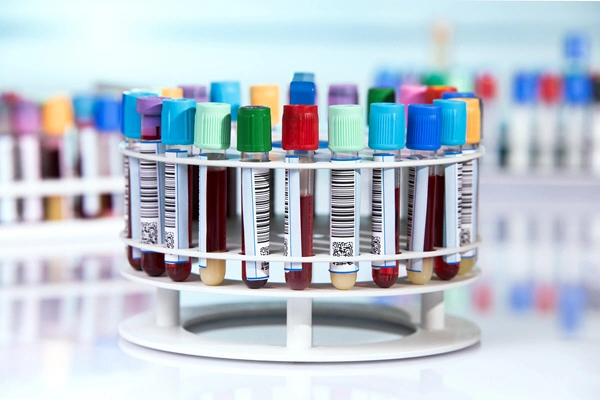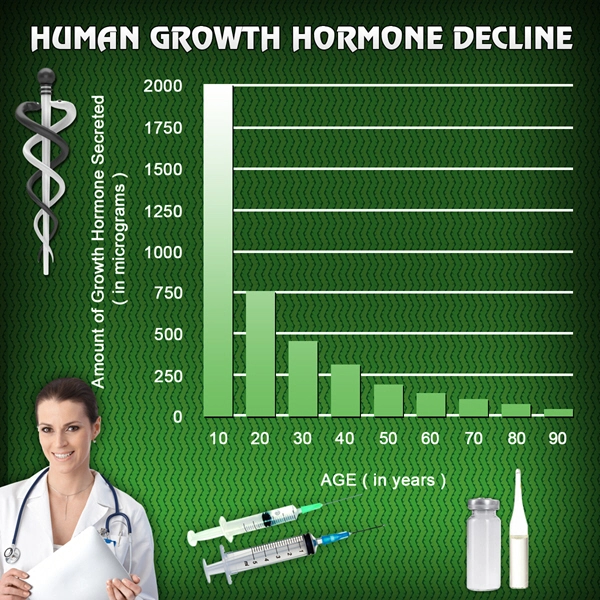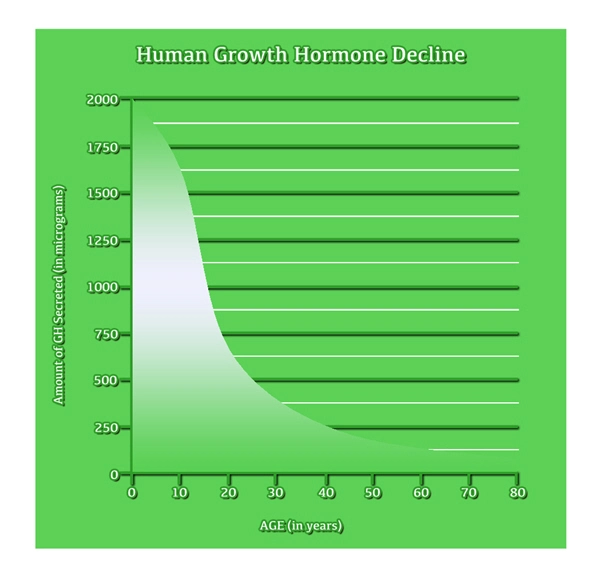Is it possible that many cases of weakness, lethargy, and sexual dysfunction are misdiagnosed by general practitioners and are really cases of adult-onset HGH deficiency?
 It is possible that some cases of weakness, lethargy, and sexual dysfunction may be attributed to adult-onset growth hormone deficiency (AGHD). These symptoms can have a wide range of potential causes, and while AGHD is not common, that in itself may lead many general practitioners to be unfamiliar with it and make them less likely to administer the proper tests to check for it. The best practice would be for a patient who is experiencing these symptoms to come directly to our clinic, where a quick and simple test will reveal whether or not AGHD is the cause.
It is possible that some cases of weakness, lethargy, and sexual dysfunction may be attributed to adult-onset growth hormone deficiency (AGHD). These symptoms can have a wide range of potential causes, and while AGHD is not common, that in itself may lead many general practitioners to be unfamiliar with it and make them less likely to administer the proper tests to check for it. The best practice would be for a patient who is experiencing these symptoms to come directly to our clinic, where a quick and simple test will reveal whether or not AGHD is the cause.
AGHD occurs when the pituitary gland does not produce enough growth hormone in adults. This condition is often associated with a number of symptoms, including fatigue, reduced muscle mass, decreased exercise capacity, and changes in body composition. Sexual dysfunction can also be a symptom of AGHD.
 Diagnosis of AGHD should be made carefully, as it at our clinic, utilizing comprehensive evaluation, including blood tests to measure growth hormone levels and other relevant hormonal markers. The physicians at our clinic are board certified, meaning that they are at the highest level of training and expertise in the very latest techniques in this emerging field – something that cannot be said of general practitioners.
Diagnosis of AGHD should be made carefully, as it at our clinic, utilizing comprehensive evaluation, including blood tests to measure growth hormone levels and other relevant hormonal markers. The physicians at our clinic are board certified, meaning that they are at the highest level of training and expertise in the very latest techniques in this emerging field – something that cannot be said of general practitioners.
If you suspect that you or someone you know may have AGHD or are experiencing these symptoms, it is advisable to consult with the healthcare professionals at our clinic. They can conduct a thorough assessment, consider the entire clinical picture, and order appropriate tests to determine the underlying cause of the symptoms and provide the most suitable treatment and management plan.
What exactly are the tests to determine potential HGH deficiency in adults over 30? Are these tests expensive or painful?
 Diagnosing adult-onset growth hormone deficiency (AGHD) typically involves a series of tests conducted by our healthcare professional team. The specific tests used may vary depending on your health profile and history, but the common ones include:
Diagnosing adult-onset growth hormone deficiency (AGHD) typically involves a series of tests conducted by our healthcare professional team. The specific tests used may vary depending on your health profile and history, but the common ones include:
- Insulin-like Growth Factor 1 (IGF-1) Test: This blood test measures the level of IGF-1 in the blood, which is a hormone produced in response to growth hormone stimulation. Low IGF-1 levels may suggest AGHD.
- Growth Hormone Stimulation Test: This is the primary diagnostic test for AGHD. It involves administering a medication that should normally stimulate the release of growth hormone. Blood samples are then taken at specific intervals to measure the response of the pituitary gland. The medications used can include insulin, arginine, glucagon, or GHRH (growth hormone-releasing hormone).
- Growth Hormone Suppression Test: In some cases, a healthcare provider may use this test to confirm AGHD. It involves administering a substance that should normally suppress the release of growth hormone. Blood samples are taken before and after the administration to measure growth hormone levels.
These tests are generally not considered painful, but they may involve some discomfort associated with blood drawing, and the duration of the stimulation or suppression test can vary. However, discomfort is usually minimal. It's important to discuss any concerns or fears with the doctors who are testing you so they can address them and make you as comfortable as possible during the testing process.
 As for cost, the expense of these tests can vary widely depending on factors like your insurance coverage, and the specific tests performed. Much of the time they will be fully covered by your health insurance, so you will pay little or nothing, but depending on your insurance company, they may be subject to deductibles and copayments. It's advisable to check with your insurance company to get a better understanding of the potential costs involved and whether they are covered by your insurance plan.
As for cost, the expense of these tests can vary widely depending on factors like your insurance coverage, and the specific tests performed. Much of the time they will be fully covered by your health insurance, so you will pay little or nothing, but depending on your insurance company, they may be subject to deductibles and copayments. It's advisable to check with your insurance company to get a better understanding of the potential costs involved and whether they are covered by your insurance plan.
Keep in mind that diagnosing AGHD can be complex, and we typically consider the results of multiple tests, along with the patient's clinical symptoms and history, to make an accurate diagnosis. If you suspect AGHD or have concerns about growth hormone deficiency, it's best to consult with the doctors at our clinic, who can guide you through the diagnostic process and discuss the potential costs and benefits of testing. Despite the complexity, we make the process very quick, and you get the results fast, and there is no significant pain at all.

- Will Human Growth Hormone Prove To Be The First Anti-aging Medication? [Last Updated On: June 8th, 2025] [Originally Added On: March 19th, 2020]
- Hgh Sprays (scam): What Is A Nanogram? The Quantity Of A Nano Gram [Last Updated On: June 12th, 2025] [Originally Added On: April 9th, 2020]
- Hgh Benefits And Effects On Skin And Hair [Last Updated On: June 11th, 2025] [Originally Added On: April 17th, 2020]
- Overall General Benefits Of Hgh [Last Updated On: June 7th, 2025] [Originally Added On: April 19th, 2020]
- Hgh Benefits [Last Updated On: June 4th, 2025] [Originally Added On: April 20th, 2020]
- HGH Is No Fountain Of Youth [Last Updated On: June 10th, 2025] [Originally Added On: April 29th, 2020]
- Hgh And Improvements In Body Composition [Last Updated On: June 13th, 2025] [Originally Added On: April 30th, 2020]
- Getting Started with Injectable HGH Treatment [Last Updated On: March 25th, 2025] [Originally Added On: January 22nd, 2022]
- Finally! Real HGH! Not Scams! [Last Updated On: September 6th, 2025] [Originally Added On: January 24th, 2022]
- Hgh Therapy Program Diary [Last Updated On: November 5th, 2025] [Originally Added On: January 24th, 2022]
- Side Effects Of Human Growth Hormone [Last Updated On: March 26th, 2025] [Originally Added On: January 27th, 2022]
- Hgh Secretagogue [Last Updated On: August 25th, 2025] [Originally Added On: January 29th, 2022]
- Weight Management And Hgh [Last Updated On: June 5th, 2025] [Originally Added On: January 29th, 2022]
- Hgh And Body Building [Last Updated On: March 27th, 2025] [Originally Added On: January 31st, 2022]
- Hgh Benefits Courtesy Of James Abernathy Ph.D [Last Updated On: September 7th, 2025] [Originally Added On: February 1st, 2022]
- Hgh Cell Regeneration [Last Updated On: March 28th, 2025] [Originally Added On: February 3rd, 2022]
- Testing Olympians Hgh Giving Unfair Advantage In Sports Performance [Last Updated On: March 29th, 2025] [Originally Added On: February 5th, 2022]
- All The Different Brands Of Human Growth Hormone [Last Updated On: March 31st, 2025] [Originally Added On: February 7th, 2022]
- Hgh Levels [Last Updated On: March 30th, 2025] [Originally Added On: February 7th, 2022]
- Test Your Hgh Blood Levels [Last Updated On: September 8th, 2025] [Originally Added On: February 8th, 2022]
- Getting Started With HGH Therapy Treatment [Last Updated On: February 23rd, 2025] [Originally Added On: February 9th, 2022]
- Human Growth Hormone 101 [Last Updated On: April 1st, 2025] [Originally Added On: February 12th, 2022]
- Hormone Frequently Asked Questions: HRT FAQ [Last Updated On: April 2nd, 2025] [Originally Added On: February 12th, 2022]
- Basic Questions About Hgh (Growth Hormone) [Last Updated On: April 28th, 2025] [Originally Added On: February 12th, 2022]
- When the Growth Hormone Revolution Began: HGH Study [Last Updated On: August 17th, 2025] [Originally Added On: February 14th, 2022]
- Hgh Doctors [Last Updated On: August 26th, 2025] [Originally Added On: February 15th, 2022]
- HGH Decline And Aging [Last Updated On: April 3rd, 2025] [Originally Added On: February 17th, 2022]
- Some Of The Symptoms Of Decreased Human Growth Hormone [Last Updated On: April 4th, 2025] [Originally Added On: February 18th, 2022]
- HGH Deficiency Test: Human Growth Hormone Levels and Decline [Last Updated On: May 2nd, 2025] [Originally Added On: February 19th, 2022]
- Effects Of HGH On Skin [Last Updated On: April 5th, 2025] [Originally Added On: February 20th, 2022]
- Humatrope HGH: Human Growth Hormone Product [Last Updated On: April 27th, 2025] [Originally Added On: February 22nd, 2022]
- Quit Wasting Time and Fix Your Hormone Imbalance NOW! [Last Updated On: April 12th, 2025] [Originally Added On: April 13th, 2022]
- The Evolution of the Human Growth Hormone Receptor Gene [Last Updated On: April 14th, 2025] [Originally Added On: June 22nd, 2022]
- My Doctor Told Me I Was Dying [Last Updated On: February 20th, 2025] [Originally Added On: July 8th, 2022]
- Was it Fibromyalgia? Nope. Was it Chronic Fatigue Syndrome? Nope. And Now I’m Cured! [Last Updated On: April 19th, 2025] [Originally Added On: August 2nd, 2022]
- How to Boost Human Growth Hormone (HGH) Levels Naturally [Last Updated On: April 24th, 2025] [Originally Added On: October 7th, 2022]
- I Wasted Four Years of My Life [Last Updated On: April 26th, 2025] [Originally Added On: October 14th, 2022]
- Tiredness: The Enemy of Life [Last Updated On: December 19th, 2025] [Originally Added On: November 22nd, 2022]
- Discover the Exercise “Sweet Spot” That Reverses Cognitive Decline and See Similar Results With Growth Hormone Injections [Last Updated On: December 1st, 2025] [Originally Added On: December 13th, 2022]
- Penny: the Mountain Climber’s Story [Last Updated On: December 24th, 2025] [Originally Added On: January 10th, 2023]
- HGH Quick Fixes Fix Nothing - Choose Legal HGH [Last Updated On: February 19th, 2025] [Originally Added On: January 25th, 2023]
- A Letter to My Fellow General Practitioners [Last Updated On: March 17th, 2025] [Originally Added On: March 8th, 2023]
- Does HGH Therapy Have Positive Benefits in Chess Competition? [Last Updated On: February 21st, 2025] [Originally Added On: March 17th, 2023]
- Should You Trust Foreign Online Pharmacies for HGH Injections? [Last Updated On: February 24th, 2025] [Originally Added On: March 30th, 2023]
- What is the Molecular Structure of HGH? [Last Updated On: March 14th, 2025] [Originally Added On: April 20th, 2023]
- The Role Hormones Play in Attractiveness [Last Updated On: March 19th, 2025] [Originally Added On: April 28th, 2023]
- Is the Easy Needle for HGH Therapy a Good Choice? [Last Updated On: August 29th, 2025] [Originally Added On: May 17th, 2023]
- My Story – My Life Was Hell to I’m Living the Dream: HGH Testimonial [Last Updated On: August 31st, 2025] [Originally Added On: June 4th, 2023]
- How Does Human Growth Hormone Aid in Inflammation Reduction? [Last Updated On: September 15th, 2025] [Originally Added On: June 9th, 2023]
- Menopausal Hormone Therapy and Cancer [Last Updated On: June 15th, 2025] [Originally Added On: June 16th, 2023]
- Is HGH Deficiency Contagious? [Last Updated On: September 19th, 2025] [Originally Added On: July 11th, 2023]
- How to Make HGH Injections Easy [Last Updated On: November 29th, 2025] [Originally Added On: August 23rd, 2023]
- HGH From Mexican Sources – Is This Safe? [Last Updated On: September 11th, 2025] [Originally Added On: September 18th, 2023]
- Introduction to HGH Therapy Treatment [Last Updated On: November 13th, 2025] [Originally Added On: February 10th, 2025]
- Understanding Human Growth Hormone (HGH) and Its Uses [Last Updated On: November 20th, 2025] [Originally Added On: February 13th, 2025]
- Biological Alchemy: The Art of Administering HGH Injections With Ease [Last Updated On: November 30th, 2025] [Originally Added On: February 15th, 2025]
- Introduction: Personal Health Crisis [Last Updated On: December 10th, 2025] [Originally Added On: February 16th, 2025]



List of USA state clinics - click a flag below for blood testing clinics.
Word Count: 727


















































